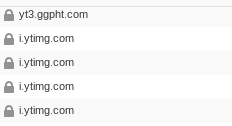- 0 Posts
- 29 Comments
Apple Maps is the best replacement for Google Maps. None of the other options even come close, but it’s only for Apple devices. Organic Maps may work for you but it depends where you are and you won’t get traffic information and the routing is very basic.
This is a valid privacy issue, and other fediverse projects like Mastodon already solve this. The problem is that by embedding an image, you can tell the client to make a network request to your server, revealing information such as your IP address and browser. The solution is to proxy media through your instance, which is presumably trusted. this hides your IP address and browser information. And as someone else mentioned here, a Content-Security-Policy can be used to ensure this attack isn’t possible in a browser.
Any thoughts on how fixable this is?
This shouldn’t be hard to fix. Lemmy needs to proxy images, there’s an open issue for this. Right now, I don’t use Lemmy outside of Tor Browser specifically because of issues like this, and the recent XSS vulnerability is making me even more concerned. Lemmy is a great project, but it needs work and probably a security audit.

 61·1 year ago
61·1 year agoI use Tailscale with my Jellyfin server.

 4·1 year ago
4·1 year agoYouTube audio quality isn’t amazing, but it’s not that bad if you get the right format. Using yt-dlp, you can get opus audio that sounds way better than mp3. Example:
yt-dlp -f 251 https://www.youtube.com/watch?v=dQw4w9WgXcQ

 3·1 year ago
3·1 year agoThe domain for Threads is threads.net, not threads.com

 1·1 year ago
1·1 year agoAdGuard DNS and NextDNS both do the same thing, there’s some differences but they’re pretty much the same (except AdGuard public DNS that doesn’t need configuration). Rethink is the same but doesn’t require an account. Rethink and TrackerControl are also Android apps that give you control over traffic locally. It depends on what you’re trying to do but any of the DNS options (AdGuard, NextDNS, Rethink) will protect multiple devices.

 11·1 year ago
11·1 year agoYou can’t follow users on Lemmy

 4·1 year ago
4·1 year agoProbably not, Piped supports higher resolutions and better video formats.

 5·1 year ago
5·1 year agoImages don’t seem to be proxied.


 5·1 year ago
5·1 year agoI like DuckDuckGo, but I’ve been using Brave Search for the AI summarizer feature.

 1·1 year ago
1·1 year agoI use Traefik and configuring everything through docker-compose files is way more convenient than nginx or a proxy manager (never used one though). Traefik also has a web interface, but you can’t configure anything with it.

 2·1 year ago
2·1 year agoJust one. Tried kbin but didn’t like it.

 4·1 year ago
4·1 year agoIf you’re on Linux, Metadata Cleaner might work. https://flathub.org/apps/fr.romainvigier.MetadataCleaner

 7·1 year ago
7·1 year agoI just use Jellyfin for movies and shows. I don’t listen to music or read ebooks, and I buy all my games through Steam because I use Linux.

 3·1 year ago
3·1 year agoOdysee is a right wing cesspool with no moderation and crypto is a complete scam at this point. https://thelinuxexp.com/Im-leaving-odysee/

 2·1 year ago
2·1 year agoTry tilvids.com. PeerTube doesn’t have much content right now, and it’s mostly videos with 1-3 views.

 14·1 year ago
14·1 year agoIf they break Piped and Invidious, I guess I’ll have to only watch Nebula content.
Matrix is less secure than Signal. While Signal and Matrix use the same encryption, Matrix doesn’t encrypt everything. This includes: message sender, message timestamps, reactions, members, read receipts, etc. All of this data can be accessed by the homeserver admin. On Matrix, you should assume that only the message content itself (text and attachments) is encrypted. Your account data is also not protected, you have to trust your homeserver admin. Signal is designed not to trust the server. It’s important to consider your threat model. Matrix doesn’t require a phone number, which makes it better for anonymity, but Signal has better security.
This is a good explanation of Matrix’s metadata leaks: https://web.archive.org/web/20210618055112/http://serpentsec.1337.cx/matrix